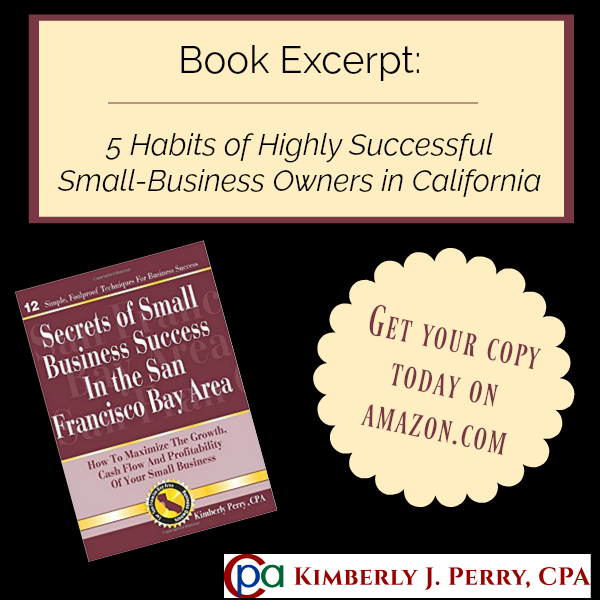5 Habits of Highly Successful Business Owners in California – December 19, 2017
 One of the strange factors of small businesses is that two businesses, operating in the same marketing arena and selling the same products or services, can have extraordinarily different results.
One of the strange factors of small businesses is that two businesses, operating in the same marketing arena and selling the same products or services, can have extraordinarily different results.
It seems odd that one business can continually grow and prosper, while the other struggles.
How can one business owner run a highly successful business while still spending a good portion of his or her time away from the business on trips and vacations with the family, and another owner work day and night only to see his business fail?
Some of it is down to the strategies and processes they follow. Choosing the right ones will give you a greater chance of being amongst those successful businesses.
But, alongside that, there is one success factor that is probably even more important.
The truth is, for the most part, there is no such thing as a successful or unsuccessful business; there are successful or unsuccessful people, entrepreneurs who run businesses.
Becoming a successful entrepreneur requires a certain self-image, a certain mindset. I like to refer to these as the “5 Habits of Highly Successful Small-Business Owners” and here they are:
Habit #1: Have a clear vision of their business, and commit their vision to paper
The chances of your small business’ success improve substantially if you have a clear vision of what you want your business to look like, and what you want it to accomplish for you in the future.
Setting direction and guiding the business toward reaching your vision will make it successful. Vision is the owner’s business philosophy. It’s his “double vision” – his ability to keep the business’ long-term dream in mind while micro-managing the business on a day-to-day, hour-by-hour basis.
Your vision should be a written statement of what your business will be when it is complete.
Habit #2: Put the proper systems in place
You need systems to be able to deliver a product or service in a predictable and consistent way. All successful businesses have a “how we do it here” manual, also referred to as a “policy and procedures” manual. Standardize your procedures so that everyone knows what they are and how to do them.
If you set up the right systems from the start, they help run the business. You can be free to spend your time however you wish: more personal time for yourself, more time for your family, your community, and more time to enjoy a richer, more balanced life.
Habit #3: Know what they don’t know and then quickly get the help to fill the void
Most small-business owners don’t realize that having an occupation or skill does not necessarily equate to building a successful business around it. It takes different skills to build a business.
You will need a number of different skills. Financial, marketing, management, and customer fulfillment skills are among those required if you want your business to run like a finely tuned machine.
Habit #4: Have a mindset of preeminence
The business owner has to have the mindset to view his business as a product – not the product or service he is producing, but his whole business as the product. It’s an entirely new way of thinking, and as soon as such thinking is adopted in any business, the business begins to make massive leaps forward.
A strategy of preeminence – of excelling – along with the approach of looking at your business as a whole, is truly transforming.
Habit #5: Work on their business, not just in it
The successful small-business owner understands the real value and reward that is derived from working on the business rather than just working in the business.
Working “on,” instead of “in,” the business is strategic work. It is the way businesses transform themselves from vision into reality. It requires asking strategic questions and then doing everything to find answers to those questions.
To achieve your potential as a small business owner, make a commitment to develop these habits. Learn more about them and seek professional expertise to help you improve.
For more on this topic, please check out my book “Secrets of Small Business Success in the San Francisco Bay Area“.